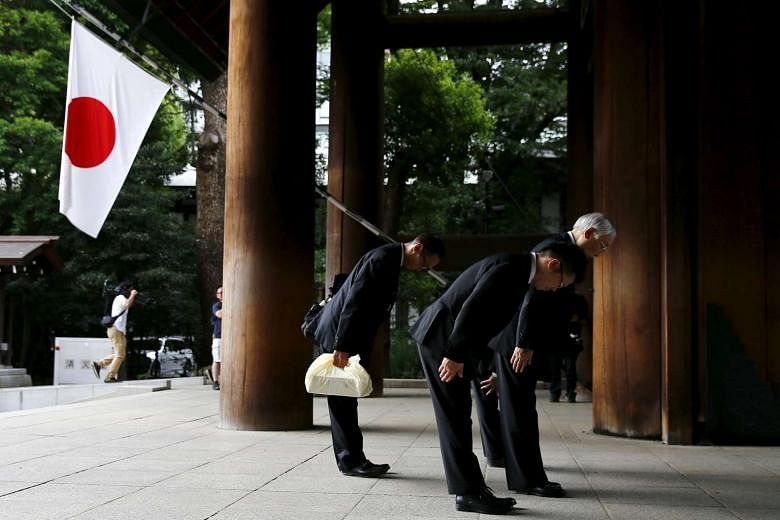TOKYO (REUTERS) - Prime Minister Shinzo Abe sent an offering to a shrine for war dead on Saturday, the 70th anniversary of Japan's World War Two defeat, but had not made a personal visit to the shrine, seen in China and South Korea as a symbol of Tokyo's wartime militarism.
The premier sent a cash offering of his own money, his aide Koichi Hagiuda, a lawmaker in Abe's Liberal Democratic Party (LDP), told reporters after visiting the shrine.
"I paid respects to the souls of those who sacrificed their precious lives in the past war," Hagiuda said, explaining that he was visiting on behalf of Abe in the premier's role as head of the LDP.
Visits to Yasukuni Shrine by Japanese top politicians outrage China and South Korea because the shrine honours 14 Japanese leaders convicted as war criminals by an Allied tribunal, along with war dead.
Abe has not visited in person since December 2013, when he said he did so to show respect for those who died for their country.
Abe, in a statement on Friday, expressed "utmost grief" for the "immeasurable damage and suffering" Japan inflicted during World War Two, but said future generations should not have to keep apologising for the mistakes of the past.
The legacy of the war still haunts relations with China and South Korea, which suffered under Japan's sometimes brutal occupation and colonial rule before Tokyo's defeat in 1945.
The remarks on Friday by Abe, seen by critics as a revisionist who wants to play down the dark chapters of Japan's wartime past, received mixed reviews abroad.
Tokyo's close ally the United States welcomed Abe's statement and his commitment to uphold apologies Japan has made in the past.
- SINCERE APOLOGY -
The United States is keen to see Japan play a greater security role in Asia in the face of a rising China and the allies are deepening already close defence ties. At the same time, Washington has stressed the need for Tokyo and its neighbours to bury historical animosities exacerbated by the war.
China, however, said that Japan should apologise sincerely to countries that suffered from its military aggression.
"Japan should make a clear explanation and a sincere apology to the people of the countries who suffered from that era of military aggression," the ministry said, in Chinese, urging Japan to "take concrete actions to gain the trust of its Asian neighbours and the global community."
South Korea said it would respond after reviewing Abe's remarks, but its foreign minister said Japan's sincere actions were "more important than anything", its Foreign Ministry said, suggesting that words alone were not enough.
North Korea, with which Japan has no diplomatic ties, condemned what it called "an attempt of the Japanese rightist conservatives to conceal its crime-woven past".
Abe, who has said he wants to repair ties with China and South Korea and could visit Beijing as soon as next month, was not expected to visit Yasukuni himself on Saturday.
But the LDP's policy chief, Tomomi Inada, attended and at least two cabinet ministers were expected to go along with scores of other conservative lawmakers.
Abe's conservative political supporters are keen for Japan to put an end to what they see as a humiliating cycle of apologies.
"We need to terminate (the cycle of apology) for our grandchildren and the grandchildren's grandchildren," said a 64-year-old man visiting Yasukuni early on Saturday.

